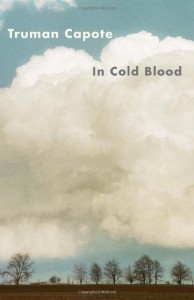Bookworm Blurbs
I absolutely adore reading - my love for books has had a huge impact on my life! I'm going to grad school to be a children's/YA librarian.
In Cold Blood

On November 15, 1959, in the small town of Holcomb, Kansas, four members of the Clutter family were savagely murdered by blasts from a shotgun held a few inches from their faces. There was no apparent motive for the crime, and there were almost no clues.
As Truman Capote reconstructs the murder and the investigation that led to the capture, trial, and execution of the killers, he generates both mesmerizing suspense and astonishing empathy. In Cold Blood is a work that transcends its moment, yielding poignant insights into the nature of American violence. (source)
I honestly did not expect to like this book very much, but I was very pleasantly surprised by how engaging this book was, even though my reading of it was constantly interrupted by my grad school homework. My book club chose this for our horror novel list and after reading The Fog, I had no idea what to expect. I certainly wasn't anticipating this.
Unlike The Fog, which is a made-up story with the sole intention of creeping out readers, In Cold Blood is a journalistic account of murders that actually happened in a small town in Kansas in the late 1950s. In Cold Blood is frequently cited as the first "true crime" novel - a book that is a factual account of a crime that actually happened, but has dialogue and completely immerses the reader, much as a novel would. Capote seems to have relied mainly on interviews with people who knew the Clutters and were involved with solving this horrific crime, which makes this book come off as exceptionally well-researched and accurate.
As much as this book interested me, there were some dull points, especially in the last section, which basically followed the post-trial lives of the killers. Unsurprisingly, their lives after their conviction were not particularly eventful, so Capote did some research on the other prisoners who were on death row at the same time when Hickok and Smith were. Though interesting, this struck me as filler information and at times it was difficult for me to stay focused on these parts of the book.
Although I did enjoy reading the book, I did some very basic research on the book and learned that it may not have been entirely ethical for Capote to publish it, at least not this particular version of it. The surviving family and friends of the Clutters are actually very much anti-In Cold Blood, for several reasons. For one thing, it is, in their opinion, not entirely accurate and some parts are exaggerated more than they should have been. For example, the oldest Clutter daughters (who were not at their parents' home when the rest of their family was murdered) felt that Capote greatly embellished their mother's mental illness and their family's wealth. Additionally, some feel that Capote is too sympathetic to Hickok and Smith. I can see where they're coming from on this. I think that Capote went to great efforts to give the reader a glimpse on who Hickok and Smith really were, in other capacities than the murderers of the Clutter family. He tried to portray them as human beings, not just monsters, and I think that he was fairly successful in that. I was thoroughly disgusted by Hickok, but there were definitely times when I felt bad for Perry Smith - while his actions were completely inexcusable, he had a really difficult life, and Capote focused a lot on that. I completely understand Capote's inclination to portray the murderers as people who are more complex than just heartless killers, but I also completely understand why this would hurt the friends and family of the Clutters. Additionally, the Clutters' friends and family seem to have felt that Capote was too invasive in his research techniques. While this resulted in a book that I think is just about as accurate as it could have been (or it at least appears to be that way), there is certainly a question of if this was the ethical thing for Capote to do. He absolutely opened old wounds and, perhaps, didn't know where to back off and let things be. Should the healing process of a community be disrupted for the sake of thorough reporting? I think this is a question that many journalists struggle with and I think that Capote ultimately decided that the healing process was worth sacrificing for his work.
This was a fascinating book to read. It has introduced me to a new genre that I think I would be interested in exploring further. I do think that Capote was treading in a moral grey area, but, from a historical standpoint, I think that this book has a lot of value. If you're interested in American crime history, definitely give this book a try.








 9
9  4
4